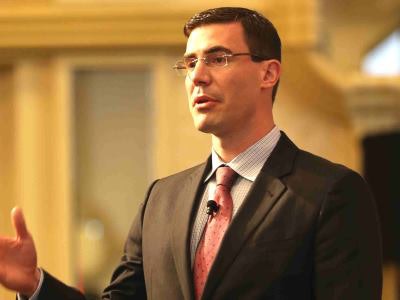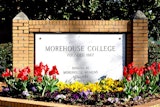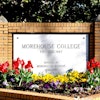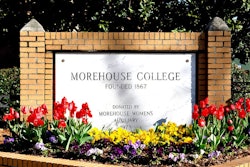 Brandon Busteed is executive director of education and workforce development at Gallup and author of the study.
Brandon Busteed is executive director of education and workforce development at Gallup and author of the study.Former student-athletes are faring better than their non-student-athlete peers on a variety of well-being indicators, a new study released Wednesday shows.
However, the study’s author concedes that he can’t say if that’s because of the student-athletes’ overall collegiate experience or the traits they possessed before they arrived on campus.
“In any kind of study like this, social science research, it’s impossible, of course, to tease out causal attribution from this data,” said Brandon Busteed, executive director of education and workforce development at Gallup. He was referring to “Understanding Life Outcomes of Former NCAA Student-Athletes: The Gallup-Purdue Index Report.”
Busteed added, however, that there is a “very interesting, very powerful correlation” between former student-athletes and higher feelings of well-being on a variety of different measures.
Among other things, the study found that former student-athletes were more likely than their non-student-athlete peers to be thriving in the areas of purpose well-being (56 versus 48 percent); social well-being (54 versus 45 percent); community well-being (51 versus 43 percent); and physical well-being (41 versus 33 percent).
In the area of financial well-being, former student-athletes were as likely to be thriving as their non-student-athlete peers (38 versus 37 percent), the study found.
The study was based on a survey of former student-athletes who received a bachelor’s degree between 1970 and 2014.
Similar outcomes held in all of the categories except physical well-being when the data was broken down by football and men’s basketball versus all other sports. To wit, only 28 percent of football and men’s basketball players were thriving in physical well-being versus 47 percent of players of all other sports.
Sandy Barbour, director of athletics at Penn State, said that the physical well-being statistic suggests it is an area in which colleges and universities should “take care.”
For the most part, the Gallup study painted a rosier than usual picture of outcomes for student-athletes. In some ways, it came across as a curious counternarrative to commonly held notions about athletes being brought on campus primarily to help teams win games, often at the price of being nudged away from academic pursuits that could distract from that cause.
It found, for example, that 65 percent of student-athletes agreed that they had a professor who cared about them as a person, compared to 59 percent of non-student-athletes.
Kendall Spencer, chair of the Division I Student-Athlete Advisory Committee for the NCAA, said that his experience as a track-and-field student-athlete at the University of New Mexico was characterized by staff and a professor “who cared about my academic and post-academic pursuits.”
“I felt comfortable pursuing a wide variety of opportunities,” said Spencer, who is currently working toward a master’s degree in sports management from Columbia University and plans to start law school this fall.
He said that the study shows that student-athletes are “actually doing OK” in a lot of the areas where the general public has negative views of the student-athlete experience.
“It doesn’t mean there’s not room to grow,” Spencer said. “But it shows we’re at least doing a couple of things right.”
Other panelists said that the fact that a proportion of student-athletes reported having a professor who cared about them as a person is one that serves as a lesson for higher education as a whole.
“Personal relationships matter,” said Jonathan Alger, president of James Madison University. “You can’t underestimate that. It matters in terms of educational development.”
Alger also said that it was important to take the teamwork skills that student-athletes acquire through college sports and make sure that other academic programs — such as business — provide opportunities for all students to acquire those skills, which he said are valued by employers.
Barbour said that she was heartened by the study’s finding that female former student-athletes were more engaged in the workplace than female non-student-athletes, 48 versus 41 percent.
She said that it points to the importance of girls becoming involved in sports — which she said happens “well before they get to us at the college level” — and that it’s important for making women feel competitive and able to “go out in the world and do the right thing.”
Mark Emmert, president of the NCAA, said that he was “pleased” and “delighted” to see student-athletes faring well on so many different measures.
“It gives me a lot of great feelings about that,” he said.
At the same time, Emmert said that it would be beneficial to see the data disaggregated by various demographic factors to get a clearer picture of the differences in well-being in different sports and different divisions.
Busteed said that the dataset did not have a large enough sample of student-athletes from Division II schools to do a comparison of all three divisions but that — as the dataset grows — Gallup will be able to do deeper analysis by sports division, race and other factors.
Jamaal Abdul-Alim can be reached at dcwriter360@yahoo.com or follow him on Twitter @dcwriter360.















